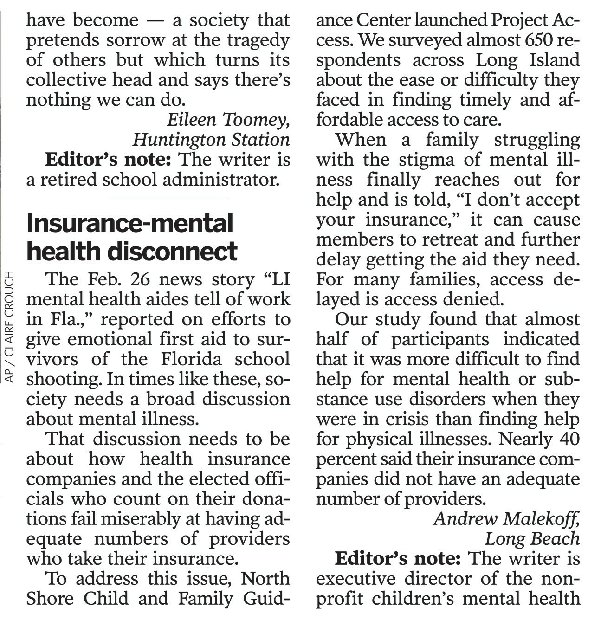by North Shore Child & Family Guidance Center | Mar 15, 2018 | In The Media, Long Island Business News
It wasn’t necessary for the slaughter of innocents at Sandy Hook to validate that there is evil in the world. But what it did affirm is that if the massacre of six- and seven-year-old children is not off limits, then nothing is.
Now there is Parkland.
In the last 40 years, the United States has mourned scores of mass murders. A number of the locales where these shootings took place were schools – Columbine, Virginia Tech, Sandy Hook, and now Parkland – that have become iconic markers of epidemic violence.
And mass shootings are not only happening in the U.S. In 1996, 16 kindergarten children and their teacher were murdered by a lone gunman in Dunblane, Scotland. Still, those are unusual occurrences in other countries, whereas we have had more than a dozen school shootings since the beginning of this year alone.
After “thoughts and prayers” are paraded around by politicians from all sides, what happens next? Many gun rights advocates, refusing to allow for the fact that our forefathers were talking about the right to bear arms such as muskets and had no conception of guns that could shoot down dozens in an instant, stand in the position that it’s not about guns but rather mental illness.
As the Executive Director of North Shore Child & Family Guidance Center, which serves children and their families facing issues such as depression, anxiety and substance abuse, I have seen the many faces of mental illness and addictions for more than 40 years. It is incredibly rare for those who are labelled as mentally ill to be violent. In fact, they are far more likely to be the victims of violence than the perpetrators.
Nevertheless, we do need to have a discussion about mental illness at times like these. That discussion, however, needs to be about how insurance companies and the elected officials who count on their donations are failing miserably at having adequate numbers of providers on their lists who take insurance. Over and over again, we hear that, before they found North Shore Child & Family Guidance Center, which never turns anyone away for inability to pay, they made numerous calls to the mental health providers on their insurer’s list and found that they no longer take insurance or are booked for months.
We also need to talk about how violence against our youth is rampant, not just in mass shootings. The faces of violence against youths are many and the impact vast. In 2013, a statistical report by the research group Child Trends visualized a hypothetical U.S. high school class of 100 graduates. Among those graduates, it estimated:
- 71 have experienced physical assault
- 28 have been victimized sexually (including 10 reporting that they have been the victims of dating violence in the past year and 10 reporting they have been raped)
- 32 have experienced some form of child maltreatment
- 27 were in a physical fight
- 16 carried a weapon in the past year
- 39 have been bullied, physically or emotionally — 16 in the past year
- 29 felt “sad and hopeless” continually for at least two weeks during the past year
- 14 thought seriously about attempting suicide, and
- 6 made a suicide attempt.
If you read between the lines and the years of mass shootings in America, if only from Columbine to Parkland, there were many more horrific events in between that have all but faded from consciousness. As journalist Gary Smith suggested, “the clock is already ticking in the land of amnesia.”
How long before Parkland, too, is gone?
Malekoff is executive director of the nonprofit children’s mental health agency North Shore Child and Family Guidance Center in Roslyn Heights, NY.

by North Shore Child & Family Guidance Center | Mar 14, 2018 | Anton Media, Project Access
From Anton Media: Andrew Malekoff discusses the Struggle for Access to Mental Health Care
 It’s a heartbreaking scenario that is far too common: someone makes the difficult decision to seek out professional help for a mental health or substance abuse problem for themselves or their loved one and is faced with a myriad of roadblocks. They start calling providers on their insurance plan and find that they are not taking new patients, or they no longer accept insurance and only want cash. And the cost of paying out of pocket is too much for many to afford.
It’s a heartbreaking scenario that is far too common: someone makes the difficult decision to seek out professional help for a mental health or substance abuse problem for themselves or their loved one and is faced with a myriad of roadblocks. They start calling providers on their insurance plan and find that they are not taking new patients, or they no longer accept insurance and only want cash. And the cost of paying out of pocket is too much for many to afford.
Here is the reality: Health insurers are required by law to offer an adequate network of providers for their beneficiaries to choose from, and not just for physical illnesses. This requirement is known in the health insurance industry as network adequacy.
Along with the difficulty of finding a provider who will accept your insurance, the problem is often complicated by a family’s reluctance to seek help for a mental health or drug problem, as opposed to physical illnesses like cancer or diabetes. Despite progress in public education, stigma still looms large.
Once someone takes the leap of faith to ask for help, he or she is too often told, “I’m sorry, I don’t accept your insurance any longer.” When this happens there is a chance they will give up.
It is this reality that spurred North Shore Child & Family Guidance Center to launch a research initiative called Project Access. This entailed creating a survey that was completed by almost 650 people across Long Island. Here is some of what we found:
• Almost 50 percent of the participants said that it was more difficult finding help for mental health or drug problems than finding help for physical illnesses, especially when they were in crisis.
• Nearly 40 percent said that their insurance company did not have an adequate number of providers.
• 66 percent reported that their insurance company was not helpful in finding a suitable provider for themselves or a loved one.
One survey respondent wrote: “A family member within my household required therapy and we had difficulty finding a provider; when we did, scheduling was a nightmare because so many patients were trying to see him. I believe it was because he was one of the few willing to accept multiple insurance policies.” This was a familiar refrain.
Health insurers reimburse mental health and addictions care providers at such low rates that they flee health insurers in droves. This is a civil rights issue and a situation that puts lives at risk.
The NY State agency that Governor Cuomo has charged with monitoring and enforcing network adequacy is the Department of Financial Services. We are using the Project Access data to demand that Governor Cuomo and the Department of Financial Services launch a full scale investigation of access to care in New York State and to hold commercial health insurers’ feet to the fire.
If you agree, print this column, add a note saying “I agree” and include your name and address. You can write to the governor at: The Honorable Andrew M. Cuomo, Governor of New York State, NYS State Capitol Building, Albany, NY 12224; email him at Press.Office@exec.ny.gov; or call him at 518-474-8418.
To read the full Project Access report go to: www.northshorechildguidance.org and click on the Project Access tab.
Andrew Malekoff is the Executive Director of North Shore Child & Family Guidance Center, which provides comprehensive mental health services for children from birth through 24 and their families. To find out more, visit www.northshorechildguidance.org.
by North Shore Child & Family Guidance Center | Mar 14, 2018 | In The Media, Project Access
Andrew Malekoff featured on Mental Health Now television program, March 6, 2018
See this televised episode of Mental Health Now devoted to the 10th anniversary of the Mental Health Parity and Addiction Equity Act of 2008. With host Matthew Shapiro, NAMI-NYS and guests Tracie Gardner, Legal Action Center and Andrew Malekoff, North Shore Child and Family Guidance Center. Filmed on March 6, 2018 https://vimeo.com/259740918

by North Shore Child & Family Guidance Center | Mar 14, 2018 | Blog
March is National Professional Social Work Month, with this year’s theme “Social Workers: Leaders. Advocates. Champions.” We thought it would be a good time to acknowledge and celebrate the many contributions these caring professionals provide to our communities.
First off, a statistic. In the United States, there are approximately 650,000 social workers, and they work in varied settings including hospitals, community mental health organizations and private practices, among others.
They also play a wide variety of roles. Some specialize in clinical work, which means providing counseling/therapy. Some focus on working with a specific population, such as veterans or children or senior citizens. Some work advocating for policy changes and social and economic justice issues in the halls of Washington or local/regional political realms.
At North Shore Child & Family Guidance Center, our social workers are versatile and perform a combination of clinical, prevention and outreach services. They operate out of our headquarters and two branch offices as well three schools and provide home visits for select families with vulnerable children that might not participate in traditional office-based mental health care.
Whatever their specialty, all social workers are bound by the NASW Code of Ethics, which calls on members of the profession “to enhance human well-being and help meet the basic needs of all people, with particular attention to the needs and empowerment of people who are vulnerable, oppressed and living in poverty.”
“With government rolling back funding on so many programs, the advocacy aspect of social workers is more important than ever,” says Andrew Malekoff, Executive Director at the Guidance Center. “The protections that came with the Affordable Care Act are in jeopardy, so we must advocate for the funding to remain for the services that our clients need.”
One of our longtime social workers is Amy Ipp-Gelb, MSW, who is the Clinical Coordinator at the BOCES Middle School in Hicksville, where the Guidance Center provides in-school mental health services to students in our Intensive Support Program (ISP). Each year Amy honors Social Work month with a dedication at the school where she has worked since 2001.
“Many of our students stay with us from 6th to 9th grades, and then either move to our High School ISP site in Wantagh or go back to their district. We see them every day, providing mental health services in school. We see them through good days and bad days. We get to know their parents and families, too.
It’s a job that Gelb truly loves. “Over the years, there’s real transformational physical and emotional growth in these young people. The reward is phenomenal.”
We thank all the social workers and other professionals in our agency and throughout the nation. They are true life-savers.
Sources:
www.socialworkers.org/
![Letter to Newsday]()
by North Shore Child & Family Guidance Center | Mar 13, 2018 | In The Media, Project Access
Letter to Newsday




